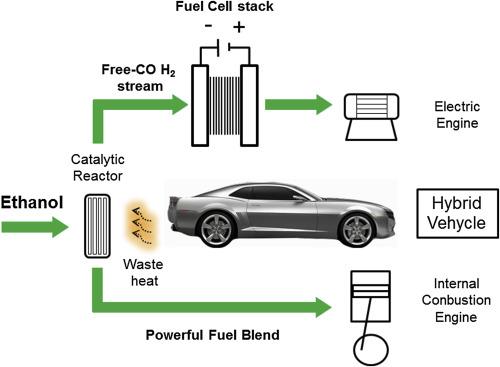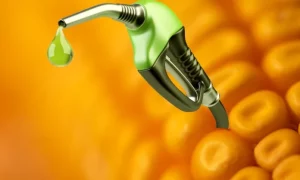Fueling the Future: Ethanol Cars at the Forefront of Clean Mobility!

The concept of ethanol cars is typically attributed to the transportation options that use ethanol blend to enhance car performance and make engine efficient to give the best performance. The best use of ethanol is blended with gasoline. However, the quantity of ethanol required is 10%, and 90% is gasoline. The blend of ethanol helps to increase the life of the engine. Automakers recommend a particular quantity of ethanol to make engine performance smooth and long last. Hence, the shift in the focus from petroleum-based vehicles to alternative fuel-based vehicles such as ethanol-based vehicles and the increasing focus of governments on ethanol-based vehicles due to concerns regarding greenhouse gas emissions are expected to foster market growth over the forecasted period. For instance, the Environmental Protection Agency (EPA) finalized federal greenhouse gas (GHG) emissions standards for passenger cars and light trucks in the US through 2026. The final standards leverage advances in clean car technology to unlock $190 billion in net benefits to Americans, including reducing climate pollution, improving public health, and saving drivers money at the pump.
In addition, the ethanol car market has witnessed significant growth in recent years, owing to the increased demand for improved vehicle performance and the inclination of consumers towards environment-friendly vehicles. Furthermore, the companies operating in the market have adopted partnerships, R&D, and product launches to increase their market share and expand their geographical presence. For instance, in 2020, according to an analysis by Argonne National Laboratory, it has been found that using corn-based ethanol in place of gasoline reduces life cycle GHG emissions on average by 40%. Using cellulosic ethanol provides an even more significant benefit. Also, adopting higher ethanol blends for more efficient engine designs gives the desired boost and is incorporated in car fuels since it is clean, renewable, abundant, and inexpensive. Such enhancements in the automotive industry to develop & implement more pristine automobiles are anticipated to drive the ethanol car market in the forecast period.
The factors such as stringent environmental regulations & vehicle emission norms, depleting fossil-fuel reserves, and less CO2 emission from ethanol vehicles, thereby supplement the growth of the ethanol car market. However, engine damage concerns and scarcity of ethanol-based fuel stations are the factors expected to hamper the growth of the market. In addition, increase in adoption of sustainable automotive technologies and increased automotive performance on higher ethanol blends creates market opportunities for the key players operating in the ethanol car market.
𝐂𝐎𝐕𝐈𝐃-19 𝐈𝐦𝐩𝐚𝐜𝐭 𝐀𝐧𝐚𝐥𝐲𝐬𝐢𝐬:
The COVID-19 crisis has created uncertainty in the ethanol car market. Governments of different regions have announced total lockdown and temporarily shutdown of industries, thereby adversely affecting the overall production and sales. It also resulted in flight cancellations, travel bans, and quarantines, which led to massive slowing of the supply chain and logistics activities across the world. Also, the COVID-19 outbreak severely impacted the automotive sector on a global level, which in turn leads to considerable drop in automotive sales, insufficiency of raw material, and others. Many small and big players in the automotive sector is witnessing issues such as halt of production activities, mandated plant closures by the government, and others. It results in a severe influence on the automobile industry’s competitiveness, economic growth, and job losses by disrupting global supply chains.
The pandemic hampered the production of crucial raw materials such as steel, which are used to produce alternative fuel-powered vehicles, hurting the global supply of these engines. For instance, in January 2021, Japanese steel output declined by 3.9%, while in January 2020, it plummeted by 9.9%. Flex fuel engine manufacturers’ (ethanol cars) production capacity has been hampered by a widening gap between supply and demand for raw materials, as well as the closure of automobile component manufacturing sites. Hence, the pandemic has had a detrimental impact on ethanol car engine suppliers due to decreased vehicle sales and manufacturing. Ethanol car engine manufacturers, on the other hand, have focused their efforts on developing and launching better ethanol vehicles through innovative methods. Owing to the development of advanced environmentally friendly automobiles with the ability to increase vehicle drivability, automotive manufacturers are increasingly using current alternative power sources to power modern automobiles.
The leading players operating in the ethanol car market are AB Volvo, ADM, Alcogroup SA, BlueFire Renewables, BMW AG, BP p.l.c., Cristal Union Group, CropEnergies AG, Cummins Inc., Ford Motor Company, General Motors, Honda Motor Co., Ltd., Mitsubishi Motors Corporation, Nissan Motor Corporation, Pannonia Bio Zrt., Petrobras, Scania, Stellantis NV, Toyota Motor Corporation, and Volkswagen AG.















